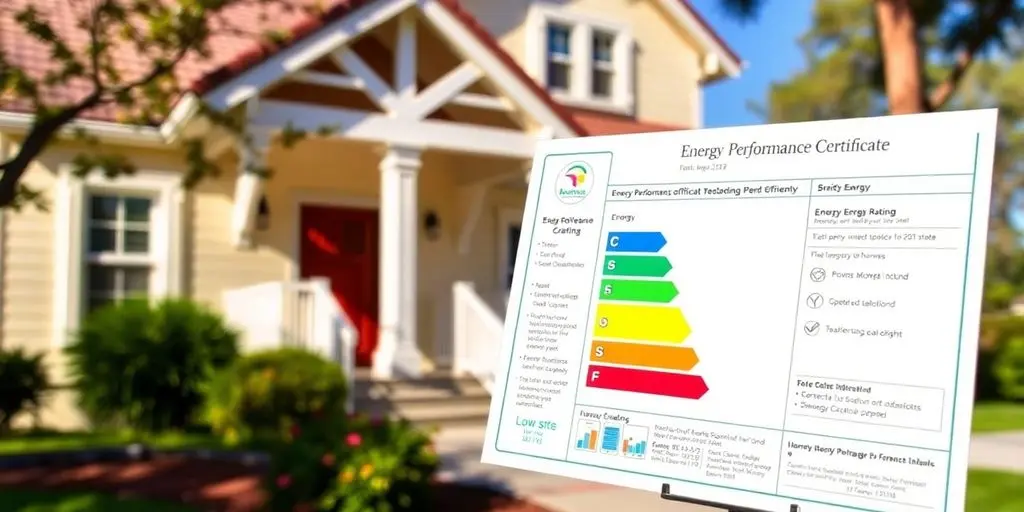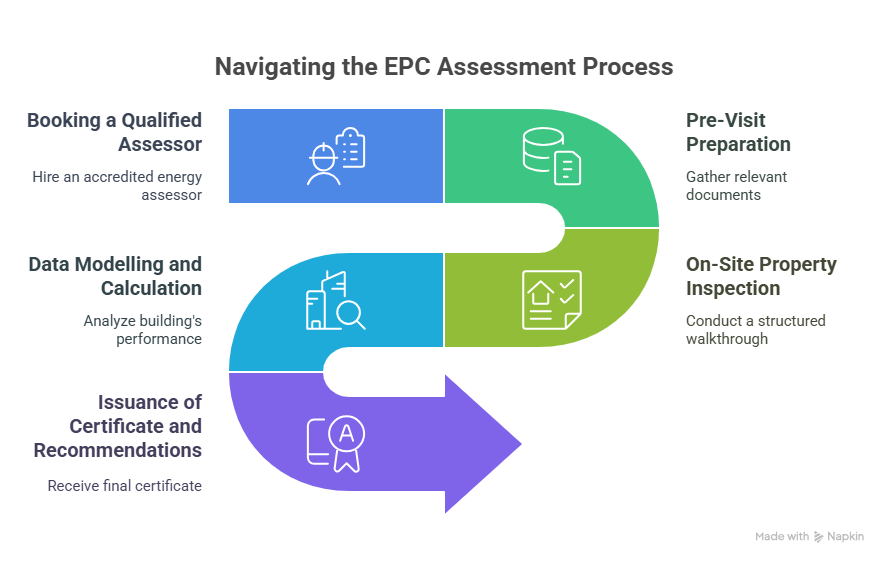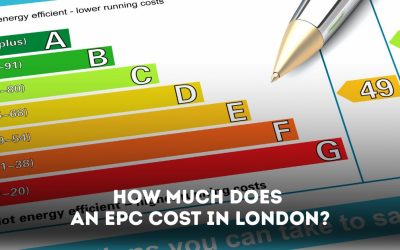Thinking of renting or selling your property in London, England? Understanding the Energy Performance Certificate (EPC) is crucial. One of the most common questions that is asked is, how long does an EPC last? In this guide, we’ll break down the efficiency certificate validity period, renewal process, legal requirements under the Energy Performance of Buildings Regulations, and how a valid certificate impacts your property’s value.
Whether you’re a homeowner, landlord, or buyer, this article will keep you compliant and informed with insights from the UK Government and Energy Saving Trust.
Key Takeaways
- An EPC is valid for 10 years from the date of issue in the UK.
- You must renew your performance certificate before selling or renting a property to meet Minimum Energy Efficiency Standards (MEES).
- An expired EPC can lead to fines from local authorities or trading standards, especially for landlords.
- Renewing your document after efficiency upgrades (e.g., insulation, heating) can improve your EPC rating and reduce energy bills.
- Check your certificate validity on the EPC Register to stay compliant.
Understanding EPC Validity in England, London

Home with Energy Performance Certificate in a sunny setting.
EPC Validity Period
An Energy Performance Certificate (EPC) is valid for 10 years from the date it was issued, as recorded on the official EPC Register at gov.uk. This applies to both domestic and commercial properties in England.
After 10 years, the EPC expires and must be renewed before selling or letting the property to comply with UK energy efficiency regulations. Landlords and sellers are legally required to provide a valid EPC to prospective tenants or buyers.
If you’ve made energy improvements since the last assessment, updating your EPC early can reflect better ratings. You can check your property’s EPC status online or contact a qualified energy assessor for a new survey.
When to Renew Your EPC
is that You must renew your EPC before it expires if you plan to sell or rent your property in London or elsewhere in England. Knowing how long does an energy performance certificate lasts can help you stay ahead of legal deadlines and avoid fines.
Under the Energy Performance of Buildings Regulations, a valid certificate is required so that potential buyers or tenants can assess a property’s energy efficiency and carbon emissions.
For landlords, the law also requires compliance with Minimum Energy Efficiency Standards (MEES), meaning your property must achieve an E rating or better.
If you’ve upgraded your property, such as adding insulation, replacing windows, or installing a modern heating system, renewing your EPC early can reflect these improvements, raise your EPC rating, and improve marketability.
Tip: To avoid delays, check your certificate’s duration or expiry date on the EPC Register. Early renewal after energy upgrades may also help reduce utility bills and attract eco-conscious buyers
Need a new EPC for your property? Contact our team at Moffat Electricals to arrange an accredited energy assessment in London.
CONTACT US
How to Renew Your EPC in the UK

Energy performance certificate on a clean surface with greenery.
Renewing an EPC is straightforward with the help of an accredited energy assessor. Here’s how to do it in London, England.
- Find an Accredited Assessor: Search for certified assessors via the Certificate Register or trusted platforms like the Efficiency Saving Trust. Ensure they’re accredited to issue performance certificates.
- Schedule a Home Visit: Arrange a convenient time for the assessment. Landlords must provide tenants with 24 hours’ written notice.
- The Assessment: The assessor will inspect your property’s efficiency features, including insulation, heating systems, windows, and renewable energy devices (e.g., solar panels).
- Receive Your New Certificate: The assessor will upload the new performance document to the Register, valid for another 10 years.
Benefits of EPC Renewal
Choosing to renew an Energy Performance Certificate (EPC) offers several key benefits for homeowners and landlords:
- Legal Compliance: A renewed certificate ensures your property meets the Energy Performance of Buildings Regulations, which is a legal requirement for selling or renting in the UK.
- Improved EPC Score: An updated energy assessment will reflect recent improvements like insulation, double glazing, or modern heating systems, potentially improving your property’s A-G energy efficiency rating.
- Increased Market Appeal: A higher EPC score enhances your property’s reputation among eco-conscious tenants and buyers, especially in competitive areas like London. Properties with strong ratings also stand out in online listings.
- Lower Energy Bills: A renewed EPC includes a recommendation report that suggests energy-saving upgrades, such as draught-proofing, LED lighting, or condensing boilers, that can reduce utility costs.
According to the Energy Saving Trust, homes with higher energy ratings can save hundreds of pounds per year, making it financially worthwhile to renew your EPC early, particularly after making improvements.
Consequences of an Expired EPC
An expired certificate can lead to serious consequences. If you’re selling or renting without a valid performance document, local authorities or trading standards may impose fines ranging from £5,000 to £30,000, depending on the property type.
Non-compliance also risks delaying property transactions and damaging your reputation with buyers or tenants. Staying proactive ensures compliance with UK government regulations and avoids legal headaches.
Common Misconceptions About EPC Renewal
| Myth | Truth |
| You need a new certificate every time you renovate.
|
Only renew post-renovation if you’re selling or renting, but it’s recommended to reflect efficiency upgrades. |
| Listed buildings require an EPC.
|
Listed buildings are often exempt under UK government regulations, but check with your local authority.
|
| An efficiency certificate is only for landlords.
|
Homeowners selling properties in England need a valid performance document. |
Legal Requirements for EPCs in the UK
EPCs and Property Sales
When selling a property in England, a valid performance certificate is legally required under the Energy Performance of Buildings Regulations. Buyers rely on the EPC rating to estimate utility bills and carbon emissions. Without one, you risk fines from Trading Standards and delays in the sale process. The Register makes it easy to verify your certificate’s validity.
EPCs and Rental Properties
Landlords in London, England, must comply with Minimum Energy Efficiency Standards (MEES), introduced in 2018. Rental properties need an EPC rating of E or above to be legally let. Non-compliant properties may require energy upgrades like insulation or energy-efficient lighting. Failure to comply can result in penalties enforced by local authorities, as outlined by the UK government.
Penalties for Non-Compliance
Ignoring certificate regulations can lead to significant fines.
- Domestic Properties: Up to £5,000 for missing or invalid performance documents.
- Commercial Properties: Fines can reach £30,000 for non-compliance with MEES. Businesses can avoid these penalties by obtaining a commercial EPC to ensure compliance.
EPC Rating Types (A to G): What They Mean for Homeowners, Landlords, and Businesses in London
EPC ratings are graded from A (most efficient) to G (least efficient). Each band reflects the estimated energy performance and environmental impact of your building. Here’s how the bands affect different property owners:
Band A & B: Highly Efficient
- Homeowners: Significantly reduced running costs and lower emissions. Excellent for long-term value.
- Landlords: Helps attract quality tenants and ensures easy compliance with regulations.
- Businesses: May qualify for sustainability grants and tax relief.
Band C & D: Average Performance
- Homeowners: Your property is doing okay, but improvements like draft sealing or boiler upgrades could increase comfort.
- Landlords: must monitor upcoming regulation changes. A D-rated property may need future improvements to meet new efficiency standards.
- Businesses: Still compliant but may miss out on green credentials or government-backed incentives.
Band E: Minimum Legal Standard for Lettings
- Landlords: Required minimum under the Minimum Energy Efficiency Standards (MEES). Letting below this rating can result in penalties.
- Homeowners: Worth improving to boost sales potential.
- Businesses: Commercial spaces rated E or below may face limitations on leasing.
Band F & G: Poor Performance
- Homeowners: Higher energy bills and reduced property value.
- Landlords: Legally prohibited from letting properties with these ratings unless exempted.
- Businesses: Often seen as high-risk; insurance and financing may be affected.
Understanding where your property sits on the scale helps you plan for upgrades, reduce emissions, and stay on the right side of UK energy regulations.
What Affects Your EPC Rating?
Several building features and upgrades directly influence your final score. Whether you’re a homeowner, landlord, or commercial property manager, here are the key factors that affect how your building is rated:
- Age and Construction: Older buildings tend to score lower due to outdated materials and lack of modern insulation.
- Heating Efficiency: The type, age, and controls of your boiler or central heating system are major influencers.
- Insulation Levels: Homes with properly insulated walls, lofts, and floors retain warmth better and score higher.
- Windows and Doors: Double- or triple-glazed windows reduce heat loss, impacting the rating positively.
- Renewable Energy Systems: Properties equipped with solar panels or air-source heat pumps generally receive higher ratings.
- Lighting Technology: Energy-saving LED bulbs throughout the property contribute positively.
Making even modest improvements in these areas can shift your property up one or more bands on the rating scale. That makes a noticeable difference in day-to-day comfort and running costs and helps meet regulatory obligations if you’re renting or selling.
The EPC Assessment Process: Step-by-Step Breakdown
Understanding the EPC assessment process can help homeowners, landlords, and commercial property owners prepare efficiently and avoid delays. Here’s how the process typically works:
Step 1: Booking a Qualified Assessor
You must hire an accredited energy assessor listed on the EPC Register. Choose one based in your area (e.g., London) who is certified to assess either domestic or non-domestic buildings, depending on your property type.
Step 2: Pre-Visit Preparation
Before the assessment, gather documents related to any recent upgrades, like
- Boiler replacement receipts
- Loft or wall insulation certificates
- Building control approvals for extensions or renovations
These can help the assessor accurately calculate your rating and avoid underestimations.
Step 3: On-Site Property Inspection
The assessor will conduct a structured walkthrough of your building, typically lasting 30 to 60 minutes. They collect data on:
- Thermal insulation (walls, roof, loft, pipework)
- Heating systems (boiler age, controls, efficiency)
- Windows and doors (glazing type and draught proofing)
- Hot water systems and ventilation
- Lighting fittings (traditional vs LED bulbs)
- Renewable installations (solar panels, air source heat pumps)
- Floor area, ceiling height, and construction materials
Step 4: Data Modelling and Calculation
After collecting the data, the assessor uses government-approved software to analyse your building’s thermal performance, emissions output, and estimated running costs. This generates your property’s A to G rating.
Step 5: Issuance of Certificate and Recommendations
The final certificate is uploaded to the EPC Register, and you’ll receive a copy via email or post. It includes:
- Your efficiency rating
- Environmental impact rating
- A list of recommended actions to improve performance
- Estimated cost savings if recommendations are implemented
Legal Note for Landlords: You are required by UK law to provide tenants with at least 24 hours’ notice prior to an assessment visit. Failing to do so may breach tenancy agreements or compliance rules.
Preparing for the EPC process not only helps ensure an accurate rating but can also support better long-term planning for upgrades and legal compliance.

Infographic showing the step-by-step EPC assessment process from booking an assessor to certificate issuance in the UK.
How EPC Ratings Impact Your Property Value
A strong Energy Performance Certificate (EPC) rating can directly influence your home’s market value, especially in London and other energy-conscious areas of the UK. Properties with A to C ratings are often seen as more desirable, offering lower running costs and reduced carbon emissions, key priorities for modern buyers.
In fact, research from the Energy Saving Trust shows that homes with better EPC bands may increase in value by up to 5%, depending on location and condition.
Energy Efficiency Improvements
Making energy efficiency upgrades is one of the most cost-effective ways to improve your EPC score and raise your property’s resale appeal. Examples include:
- Insulation: Adding cavity wall or loft insulation helps retain heat and reduce waste.
- Heating: Upgrading to a condensing boiler significantly improves energy usage.
- Lighting: Switching to LED or low-energy lighting cuts consumption with minimal cost.
Schemes like the Great British Insulation Scheme offer grants to help fund these improvements, making it easier to raise your EPC band and boost long-term property value.
Future of EPC Regulations in the UK
Upcoming Changes in EPC Standards
The UK government is committed to net-zero by 2050, meaning performance certificate regulations will likely tighten. While some proposed changes (e.g., higher MEES thresholds) were shelved in 2023, new consultations may introduce stricter energy efficiency standards or revised assessment methodologies. Stay updated via gov.uk or the Efficiency Saving Trust.
Government Initiatives for Energy Efficiency
Initiatives like the Great British Insulation Scheme and Boiler Upgrade Scheme provide grants for insulation, heating, and renewable resource devices. These reduce the cost of achieving a better EPC rating and support carbon emission reductions.
Impact on Landlords
Landlords in London, England, must ensure rental properties meet MEES requirements. Future regulations may raise the minimum efficiency rating to C, requiring property upgrades. Proactive landlords can leverage UK government grants to stay compliant and avoid fines from local authorities.
Wrapping It Up – How Long Your EPC Lasts and When to Renew It
An Energy Performance Certificate is valid for a 10-year duration in the UK. But if you’re wondering how long does an energy performance certificate last, remember that renewal is required before selling or renting a property in London, England.
A valid certificate ensures compliance with the Energy Performance of Buildings Regulations and enhances your property’s efficiency appeal. Use the EPC Register to check your validity and contact an Accredited Energy Assessor for renewals. By staying proactive, you’ll avoid fines, reduce energy bills, and boost your property’s value.
Ready to renew your EPC? Book a certified assessor through Moffat Electricals’ services for a hassle-free process in London.
Frequently Asked Questions
How long is an EPC valid in the UK?
An efficiency certificate is valid for 10 years from date, as recorded on the EPC Register.
When should I renew my EPC?
Renew before expiry if selling or renting a property or post-renovation to reflect property upgrades.
What happens if my EPC expires?
An expired certificate is fine unless you’re selling or renting, when a valid performance document is required to avoid fines.
How can I renew my EPC in London?
Contact an accredited energy assessor via the EPC Register for a new assessment.
What are the benefits of renewing my EPC?
Renewal ensures compliance, reflects energy upgrades, and improves resource management, reducing utility bills.
What penalties can I face for non-compliance?
Fines range from £5,000 (domestic) to £30,000 (commercial) for missing a valid EPC, enforced by Trading Standards or Local Authorities.





0 Comments